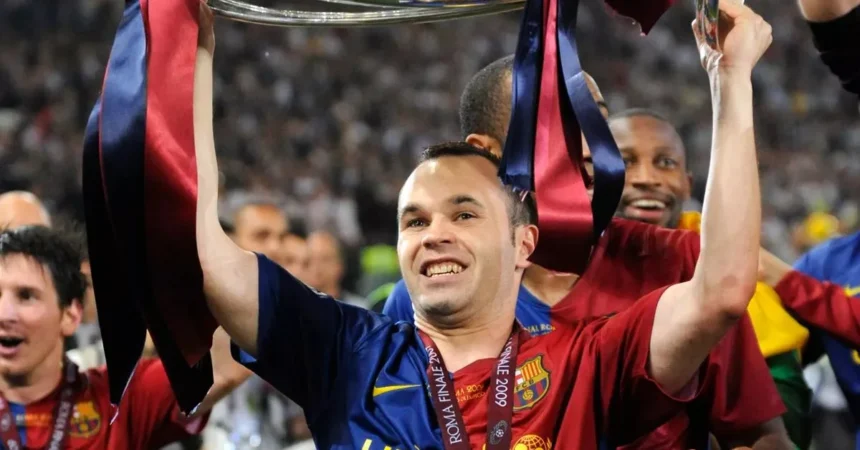Andrés Iniesta, one of the most decorated and respected figures in football history, has announced his retirement from professional football at the age of 40. The Spanish maestro, known for his exceptional vision, intelligence on the pitch, and ability to change games with a single touch, leaves behind a legacy that has transcended the sport. Iniesta’s retirement marks the end of an era, as one of the last remaining players from Spain’s golden generation that dominated international football in the late 2000s and early 2010s, and one of FC Barcelona’s most iconic figures.
Early Beginnings: A Star in the Making
Andrés Iniesta was born in the small town of Fuentealbilla, Albacete, Spain, on May 11, 1984. His talent with a football was evident from a very young age. By the time he was 12 years old, Iniesta had caught the attention of the world-famous La Masia academy, FC Barcelona’s prestigious youth training center, where he would go on to develop into one of the most technically gifted players of his generation.
At La Masia, Iniesta’s football education flourished, and it didn’t take long for him to stand out. By the time he was 18, he was already on the radar of Barcelona’s first team. In 2002, Iniesta made his senior debut for Barcelona, and although his early years were marked by gradual progress, it soon became clear that he was destined for greatness.
Breaking Through at Barcelona: From Talent to Superstar
It was under the tutelage of managers like Frank Rijkaard and Pep Guardiola that Iniesta’s true potential was unleashed. While initially overshadowed by other big names like Ronaldinho and Deco, Iniesta’s consistency, work ethic, and footballing intelligence saw him emerge as a central figure in Barcelona’s midfield alongside another academy graduate, Xavi Hernández.
Together, Iniesta and Xavi formed one of the greatest midfield partnerships in football history. Their ability to control games, dictate the pace of play, and create chances with their pinpoint passing made Barcelona virtually unbeatable during the late 2000s and early 2010s. Under Pep Guardiola, Barcelona played a style of football known as “tiki-taka,” a possession-based game that relied on short, quick passes, and Iniesta was at the heart of this system.
Iniesta’s breakthrough moment came in the 2005-2006 season when he helped Barcelona win their first Champions League title in over a decade. His versatility was one of his greatest strengths; Iniesta could play as a central midfielder, attacking midfielder, or even as a winger when needed, making him indispensable to the team.
The Golden Years: Success with Club and Country
The period from 2008 to 2012 can be considered the golden years of Iniesta’s career. During this time, he not only helped Barcelona reach new heights, but he also played a pivotal role in Spain’s international success. Iniesta was a key member of the Spanish national team that won back-to-back European Championships (2008, 2012) and the FIFA World Cup in 2010.
Perhaps Iniesta’s most famous moment came during the 2010 World Cup final. In a tightly contested match against the Netherlands, with the game tied 0-0 deep into extra time, Iniesta scored the winning goal in the 116th minute, securing Spain’s first-ever World Cup. The image of Iniesta celebrating, revealing a shirt that paid tribute to his friend Dani Jarque, who had tragically passed away, remains one of the most iconic moments in football history.
Iniesta’s performances during Spain’s dominance of world football earned him widespread acclaim. He was named the UEFA Best Player in Europe in 2012 and was consistently nominated for the Ballon d’Or, finishing runner-up in 2010. Despite never winning the prestigious individual award, Iniesta is widely regarded as one of the greatest players never to have won the Ballon d’Or.
The Barcelona Dynasty: A Legacy of Excellence
At Barcelona, Iniesta continued to rack up titles, playing an integral role in what many consider the greatest club side of all time. Under Pep Guardiola, Barcelona won an unprecedented sextuple in 2009, including the UEFA Champions League, La Liga, Copa del Rey, FIFA Club World Cup, UEFA Super Cup, and the Spanish Super Cup. Iniesta was instrumental in each of these triumphs, consistently delivering in the biggest games, whether it was providing assists, scoring crucial goals, or controlling the tempo of matches.
In total, Iniesta won 9 La Liga titles, 4 Champions League titles, and numerous domestic cups during his time at Barcelona. He also became the captain of the club after the departure of his longtime teammate and friend, Xavi, in 2015. As captain, Iniesta continued to lead by example, helping Barcelona maintain their dominance in Spanish football.
By the time he left Barcelona in 2018, Iniesta had made over 674 appearances for the club, scoring 57 goals and providing countless assists. His farewell match at the Camp Nou was an emotional occasion, with fans, teammates, and opponents alike paying tribute to one of the game’s true greats.
Moving to Japan: The Next Chapter
After leaving Barcelona, Iniesta embarked on a new chapter in his career, signing with Japanese club Vissel Kobe. While many saw this move as the beginning of the end for Iniesta’s playing career, the Spanish maestro continued to perform at a high level, even in his late 30s. In Japan, Iniesta’s presence not only elevated the quality of football in the J-League but also brought significant global attention to the league.
Iniesta’s time at Vissel Kobe was marked by several memorable moments, including winning the Emperor’s Cup in 2019 and the Japanese Super Cup in 2020. His leadership and experience were invaluable to the club, and he quickly became a fan favorite in Japan, just as he had been in Spain.
Retirement: A Legend’s Final Goodbye
On October 8, 2024, at the age of 40, Andrés Iniesta officially announced his retirement from professional football. While the news was not unexpected given his age, it still marked the end of an era for football fans worldwide. For over two decades, Iniesta had graced the football pitch with his elegance, skill, and humility, earning the respect of teammates, opponents, and fans alike.
In his retirement speech, Iniesta expressed his gratitude to all the clubs, teammates, coaches, and fans who had supported him throughout his career. He also spoke about his desire to remain involved in football in some capacity, whether as a coach, mentor, or ambassador for the sport.
Iniesta’s Influence on the Game
Iniesta’s influence on the game of football cannot be overstated. He was not the most physically imposing player, nor was he known for flashy tricks or a high goal-scoring record. Instead, Iniesta’s genius lay in his understanding of the game, his ability to make the right decisions under pressure, and his unmatched technical ability.
He is often cited as an example of how intelligence, teamwork, and skill can triumph over physicality in modern football. Iniesta’s football IQ, vision, and ability to operate in tight spaces made him a player who could break down even the most stubborn defenses. His performances in the biggest matches—World Cup finals, Champions League knockout rounds, and El Clásicos—cemented his reputation as a player who thrived on the grandest stages.
Personal Life and Off-the-Pitch Legacy
Off the pitch, Iniesta is known for his humility and generosity. Unlike many of his contemporaries, he has always shied away from the limelight, preferring to let his football do the talking. Iniesta’s demeanor and conduct have earned him the admiration of fans and fellow players alike. Throughout his career, he was a role model for young players, demonstrating that success could be achieved through hard work, dedication, and respect for the game.
Iniesta is also involved in several charitable ventures, including his own foundation, which aims to support children in need. His legacy extends beyond football, as a symbol of humility, sportsmanship, and professionalism.
The Next Chapter: Life After Football
As Iniesta transitions into life after football, there is much speculation about what his next move will be. Many expect him to pursue a coaching career, given his deep understanding of the game and his experience working under some of the best managers in football history. Whether he chooses to coach, manage, or take on an ambassadorial role, one thing is certain: Andrés Iniesta will continue to have a profound impact on the world of football.
For now, fans around the world will take a moment to reflect on the incredible career of a footballing legend who left an indelible mark on the sport. Andrés Iniesta will forever be remembered as one of the greatest players to ever grace the pitch, a true legend of the beautiful game.
#AndresIniesta #SpainFootball #BarcelonaLegend #FootballRetirement #WorldCupHero #FCBarcelona #LaLiga #FootballIcon #SpainGoldenEra #IniestaRetires







